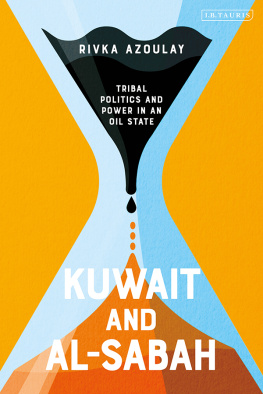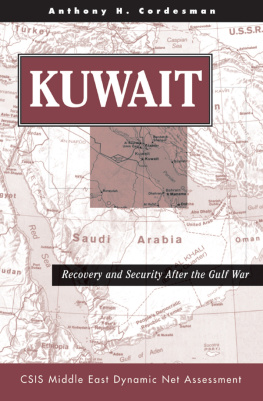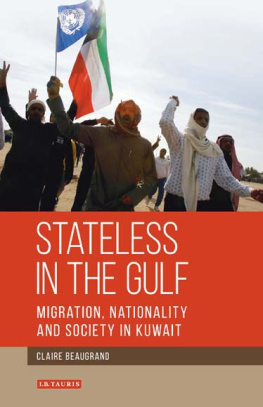ROUTLEDGE LIBRARY EDITIONS: SOCIETY OF THE MIDDLE EAST
Volume 11
KUWAIT: THE TRANSFORMATION OF AN OIL STATE
KUWAIT: THE TRANSFORMATION OF AN OIL STATE
JILL CRYSTAL
First published in 1992 by Westview Press, Inc.
This edition first published in 2016
by Routledge
2 Park Square, Milton Park, Abingdon, Oxon OX14 4RN
and by Routledge
711 Third Avenue, New York, NY 10017
Routledge is an imprint of the Taylor & Francis Group, an informa business
1992 Jill Crystal
All rights reserved. No part of this book may be reprinted or reproduced or utilised in any form or by any electronic, mechanical, or other means, now known or hereafter invented, including photocopying and recording, or in any information storage or retrieval system, without permission in writing from the publishers.
Trademark notice: Product or corporate names may be trademarks or registered trademarks, and are used only for identification and explanation without intent to infringe.
British Library Cataloguing in Publication Data
A catalogue record for this book is available from the British Library
ISBN: 978-1-138-19040-5 (Set)
ISBN: 978-1-315-62817-2 (Set) (ebk)
ISBN: 978-1-138-19454-0 (Volume 11) (hbk)
ISBN: 978-1-315-62877-6 (Volume 11) (ebk)
Publishers Note
The publisher has gone to great lengths to ensure the quality of this reprint but points out that some imperfections in the original copies may be apparent.
Disclaimer
The publisher has made every effort to trace copyright holders and would welcome correspondence from those they have been unable to trace.
KUWAIT
The Transformation of an Oil State
Jill Crystal
Westview Profiles/Nations of the Contemporary Middle East
Photos courtesy Kuwait Oil Company, Press and Publications Division, unless otherwise attributed
All rights reserved. No part of this publication may be reproduced or transmitted in any form or by any means, electronic or mechanical, including photocopy, recording, or any information storage and retrieval system, without permission in writing from the publisher.
Copyright 1992 by Westview Press, Inc.
Published in 1992 in the United States of America by Westview Press, Inc., 5500 Central Avenue, Boulder, Colorado 80301-2847, and in the United Kingdom by Westview Press, 36 Lonsdale Road, Summertown, Oxford OX2 7EW
Library of Congress Cataloging-in-Publication Data
Crystal, Jill.
Kuwait : the transformation of an oil state / Jill Crystal.
p. cm. (Westview profiles. Nations of the contemporary Middle East)
Includes bibliographical references and index.
ISBN 0-8133-0888-7
1. Kuwait. I. Title. II. Series: Profiles. Nations of the contemporary Middle East.
DS247.K8C79 1992
953.67dc20
92-6019
CIP
Printed and bound in the United States of America
| The paper used in this publication meets the requirements of the American National Standard for Permanence of Paper for Printed Library Materials Z39.48-1984. |
10 9 8 7 6 5 4 3 2 1
To my son, Malcolm
Contents
The Iraqi invasion of Kuwait in August 1990 brought tremendous upheaval to a state that had already experienced unprecedented change in the previous three decades because of oil. This book analyzes the transformations wrought both by oil and by Iraq, placing them in their broader social context and drawing attention to the linkages among changes in the economic, social, and political realms. Although this book pays explicit attention to oil and its impact, it also goes beyond oil to analyze the previously neglected patterns of life in Kuwait and to introduce the reader to the specific contours of this Gulf state.
An overview of the state is given in . The effects of the invasion, occupation, and war on Kuwaits economy, society, and politics are traced, and the problems of postwar reconstruction are considered. An analysis of political liberalization and its limits in Kuwait concludes the chapter.
The book is based on several years familiarity with Kuwait and on research trips to the state. It builds on the existing research on Kuwait in English and in Arabic and on a synthesis of British, U.S., and Gulf primary and secondary sources.
A number of people made helpful comments on drafts of the book. I am thankful to Dale Eickelman, Bernard Reich, and F. Gregory Gause III for reading all or part of the manuscript. Dr. Hassan al-Ibrahim and Dr. Fawzi al-Sultan very kindly provided useful recent material. I also owe thanks to my writing companions, Majnoon and Bob, who offered no intellectual support whatsoever. My husband, Russell Balch, deserves, as ever, my thanks for reading and commenting on the entire draft and for other, less tangible support. I owe a special thanks to my son, Malcolm, whose arrival proved that it is possible to be both productive and reproductive.
Jill Crystal
. Source: Central Intelligence Agency
One of the main themes that has dominated Kuwaits history is the development and protection of its small community from external threats. Although oil restructured the domestic and international environment, it did not weaken either Kuwaits sense of identity or its perceived vulnerability. Since the mid-eighteenth century Kuwaits people have had a distinct sense of themselves as Kuwaitis. Kuwaitis have also, however, always had a larger political identity as wellas Gulfians, as Arabs, as Muslims, and as members of the world community.
The second main theme in Kuwaiti history is internal rivalry: the recurring tension over the rules governing relations among members of the community. The sense of being Kuwaiti has never been equally shared by all members of the community; community has never meant equality. Although Kuwaitis close ranks against outsiders, this front has always masked internal tension over access to power, status, and wealth. These rivalries often find expression in explicitly political debates over the conventions governing the relationship between rulers and ruled, resulting in a recurrent alternation between representation and repression in Kuwaiti politics as the extent of political space is defined and redefined. Rarely, however, have these debates been allowed to threaten the basic consensus on the larger Kuwaiti national identity.
Kuwaits location and size have contributed to its particular identity. Kuwait is a small state. From north to south, it is about 200 km; from east to west, about 170 km. Its population is likewise small. The 1985 census, the most recent, put the number of inhabitants officially at 1,697,301of whom less than half, only 681,288, were Kuwaitis. Kuwaits small size makes it internally more cohesive but also more vulnerable to outside aggression. Kuwait has big neighbors: Saudi Arabia to the south, Iraq to the west and north. Only in the east does Kuwait open to the waters of the Gulf, where still other threats lie.













